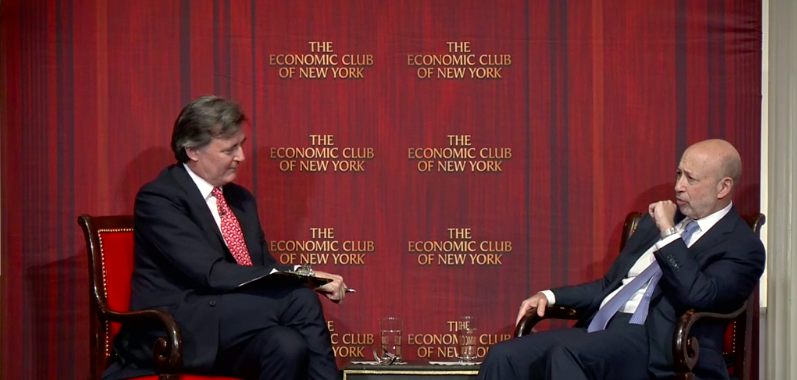Goldman CEO: We are not in a 'suicide pact' on trade
As trade tensions heat up between the U.S. and China, longtime Goldman Sachs (GS) CEO Lloyd Blankfein commented that he doesn’t think we’re in a “suicide pact” that will cause the economies to collapse.
The tough talk on trade intensified this week, when President Donald Trump threatened to impose tariffs on $200 billion of Chinese goods and China indicated it would retaliate. Just last week, Trump announced tariffs on $50 billion of Chinese imports and China followed with tariffs on $50 billion of U.S. imports.
A broader negotiating strategy
The rhetoric around trade could be part of a broader negotiating strategy, according to Blankfein.
“I do think as some people have commented on this is kind of a negotiating pattern — that would be my best take,” Blankfein said at an event hosted by the New York Economic Club.
Goldman Sachs’s clients consist of multi-national corporations that are watching these trade issues closely.
Blankfein acknowledged that there’s a lot of frustration with China from the U.S. Meanwhile, China is also frustrated with the sudden aggressiveness of U.S. policy, he added.

“But anybody who has transacted with China appreciates the potential of China, has had good experiences in China, and frustrating experiences in China. And at various times, one or the other comes to the fore.”
‘What you’re doing might not be such a bad thing’
He noted that there could be people who are publicly speaking out against the approach to trade with China but privately supporting it.
“Publicly making these statements because they do business in China and you have to pay homage to your clients in China and your customers in China. At the same time, when they’re not in public, could very well be going to the U.S. government and saying, ‘What you’re doing might not be such bad thing.'”
He added that the current approach to trade is not his style.
“[But] if you want to show is — if you want to give somebody an incentive to see the world from your point of view, it doesn’t help to remind them of your negotiating position if it’s a better one,” he said.
He continued: “The fact is if we go tit-for-tat, by the time you get to 100, they run out of things to apply a tariff to and we don’t. If you want to make that point, you make that point. That’s what you do if you’re crazy and really wanted to end free trade. And that’s what you’d do if it was a negotiating position and you wanted to remind your negotiating counterparty of just how much firepower you have to bring to the negotiation, which one is it?”
—
Julia La Roche is a finance reporter at Yahoo Finance. Follow her on Twitter. Email tips to laroche@oath.com.


